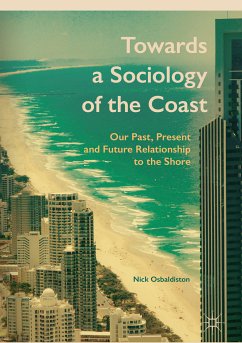This book seeks to understand the coast as a place that has deep significance both historically and sociologically. Using several case studies in Australia, the author uses Max Weber's approach to rationalisation to understand the different ways coasts have been interpreted throughout modern history. While today, coastal places are known for their aspects of lifestyle or adventure, their histories, underpinned by colonialism and industrialization, are vastly different. The author examines the delicate dichotomy between the alternative experiences the coast provides today, versus the ideals and values imposed upon it in times gone by. The author makes an ethical argument about the ways in which we use and experience the coast today will adversely affect the lives of future generations in an attempt to generate further discussion amongst students and scholars of the sociology of place, as well as coastal managers and stakeholders.
Dieser Download kann aus rechtlichen Gründen nur mit Rechnungsadresse in A, B, BG, CY, CZ, D, DK, EW, E, FIN, F, GR, HR, H, IRL, I, LT, L, LR, M, NL, PL, P, R, S, SLO, SK ausgeliefert werden.









